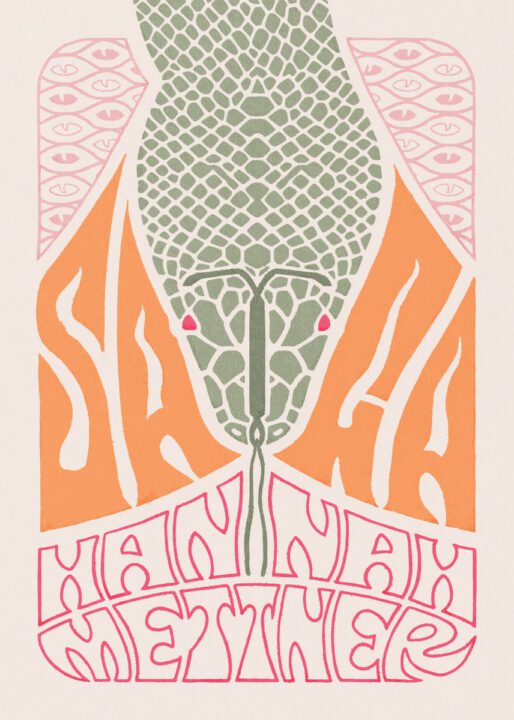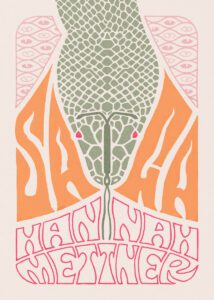Saga

Saga by Hannah Mettner. THWUP (2023). RRP: $25. HB, 88pp. ISBN: 9781776921157. Reviewed by Vera Hua Dong.

Hannah Mettner’s Saga offers a full-bodied subterranean vehemence, and profound social commentary and thought, inspired by her personal observations and sensibility. She delivers deep reflections without reserve on matters of importance to her. And she is not afraid of opening a wound and showing the reader the blood beneath. Although I grew up reciting classic Chinese poems, rhymed and symmetrical, poems that were odes to the beauty of nature or lamentation of lost hopes, I found Hannah’s intimate inner monologues a welcome disruption to the poetic aesthetic that I am accustomed to. Poetry, as I’ve been reminded from reading Saga, has an essential role in reshaping our view of ourselves and the world around us
‘Birth Control’ is the third and longest poem in this collection, and perhaps the most urgent and potent, with the aim and the power to disturb and deconstruct. It starts with a story of an anaconda’s ‘virgin birth’ told with a touch of sarcasm. With no pause or hesitation, it moves on from ‘we’ to ‘I’, to Madonna, Santa Maria, and to original sin.
Everyday I’d think it’d stopped, but it kept coming—
Mary’s stigmata, Eve’s—relentless
Like the blood after birth—
Uterus closing like a fist
With nails cutting into the palm. (‘Birth Control’, p.15)
Why has a woman’s uterus been punished for the sins of Adam? Like Jesus nailed to The Cross for humanity? Why would the ‘T-shaped thing inside me’ (p.14) make The Pope ‘sweep down to deny me entry like Jesus in The Last Judgment’? (p.14)
She would cry, and you would too, for spending your life
a servant to fire, and never knowing
how it felt to burn. (‘Birth Control’, p.17)
The sharp and sudden change of perspective, from ‘she’ to ‘you’, from third person to second, the breaking of the fourth wall, is the poet looking straight into her readers’ eyes, challenging them to rethink the cult, the myth and the worship of the Virgin Mary. To be aware, to be alert, and to realise it is not right to allow anything to ‘dazzle us into a submissive kind of belief’ (p.16), we must rise above ‘smoke and ash’ (p.14).
This also echoes a quote from Mary Ruefle’s ‘Saga’, which Mettner borrows as the prelude of her collection.
Everything that ever happened to me
Is just hanging—crushed
And sparkling—in the air… (Prelude, p.9)
Mettner’s first poem ‘Saga’ evokes the connection between the past and present, where we are from and where we are going.
In the tradition of my people, I come to you
with a long and winding story that neither
starts at the beginning nor finishes at the end. (‘Saga’, p.11)
‘Saga’ reminds me of New Zealand painter Penny Howard’s iconic red thread—linking the past with the present, sharing a Maori world view: to take the past with us into the future for guidance, ka mua ka muri. Just as, in traditional Chinese families, the ancestral shrine dominates the altars of our family rooms. So that, even after death, the ancestors continue to be seen and acknowledged among the younger generations, by both receiving offerings and offering their blessings.
In ‘Breakup poem at Auckland Art Gallery Toi o Tamaki’ (p.33) the speaker says to herself ‘What a cunt. Always getting in my own way’ (p.33) and ‘The problem with me is that I want that kind of love anyway’ (p.34). Again, Mettner is reflecting how women think, act and live not according to their own desires but based on inherited societal expectations.
Mettner’s voices and words are alive and breathing. Hard to hear and harder to ignore. No one could or perhaps should resist their power and their calling.
Vera Hua Dong writes flash fiction to help reconnect with her childhood, family, and old friends. Her stories and poetry were published at Flash Frontier, Reflex Fiction and collected in New Zealand anthologies. She won the National Flash Fiction Day competition in 2020. Vera was born and grew up in Nantong, a small city along the east coast of China. She is now living in Kerikeri, New Zealand.